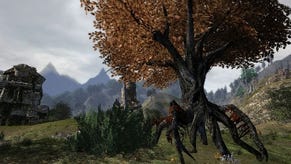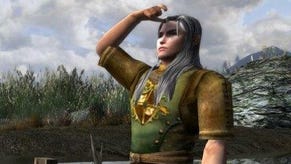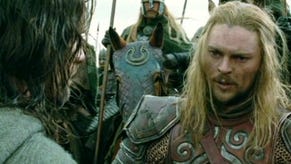The Lord of the Rings Online
Elves and Men and Nasssty Orcses...
Building the Fellowship
Another interesting aspect of LOTRO - which isn't entirely new, but won't be familiar to most MMO players - is the concept of group "feats" in battle. This is a mechanic which is basically meant to make grouped combat into a more interesting, dynamic affair, by allowing your group to stack up special combo attacks on an enemy.
The way it works is that certain attacks or circumstances in a battle will trigger the start of a chain - which makes a number of coloured "gems" appear on the screen of other members of your party. Selecting one of those gems (they only pop up for a few seconds) will fire off the next ability in the chain, which could be anything from a special attack to a buff or a heal.
Like many things in Lord of the Rings, there are different levels of complexity to explore with this system. For beginners or causal players, just stabbing one of the coloured gems will be enough - selecting one of the options is always better than just doing nothing. However, as players progress through the game, they'll find that certain options open up the potential for increasingly powerful chains - and raid groups late in the game will be able to use the group feats as a core part of their battle strategy.
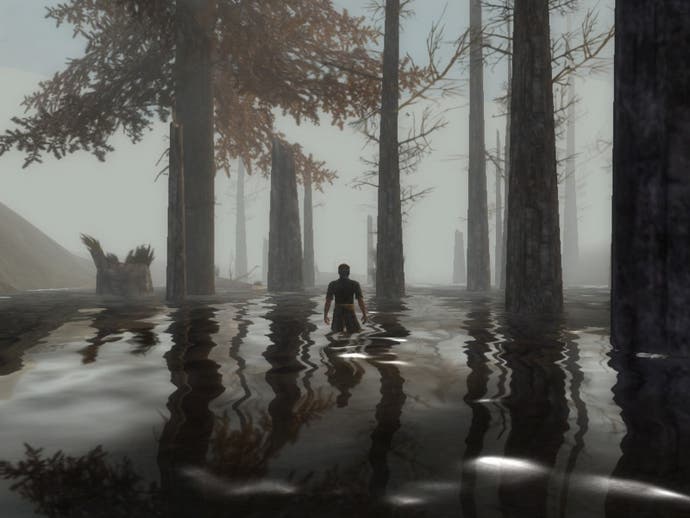
Outside of major changes like these, LOTRO offers pretty much everything you'd expect from an MMORPG which is being positioned as a challenger to World of Warcraft. Guilds (called Kinships), instanced raids and duelling are all built into the game, and Turbine has tried to balance out the proportion of instanced to shared-world content so that players don't spend too much time outside the main game world. Some key areas of LOTR are instanced, though - Weathertop, or Amon Sul, being one of them, with an early instanced quest where you need to battle your way through an orcish encampment to get to the top of the hill.
There are ten crafting professions in the game, which work in a manner similar to WOW - you collect ingredients, acquire a recipe, and make objects in this manner. While this is very accessible for new players, it's not exactly challenging or particularly interesting for more advanced or hardened RPG veterans. Turbine assures us that once you master the basic levels of crafting, there's plenty to do for players who want to further down the crafting path - and certain extremely rare and valuable items can only be made by master crafters, using recipes and ingredients which aren't available to those who are merely dabbling in the profession.
Then there are a host of nice little additions to the game, touches which make it feel like a well-considered product. There are technical systems like in-game voice chat, which should make playing in groups altogether more interesting, and there are also certain weird but nicely implemented aspects of the game which demonstrate that Turbine has been thinking about this a bit more deeply than some of its rivals. For example, there's the Dread and Hope system, which draws on a key element of Tolkien's writing. When you're near a very evil place or enemy, Dread effects start to claw at your character's mind - they can cause you to lose health, to slow down, or even to experience weird graphical effects. Dread, however, can be counter-acted by items which generate Hope - remember the Vial of Galadriel, which Frodo carried in the books?
Monster Mash
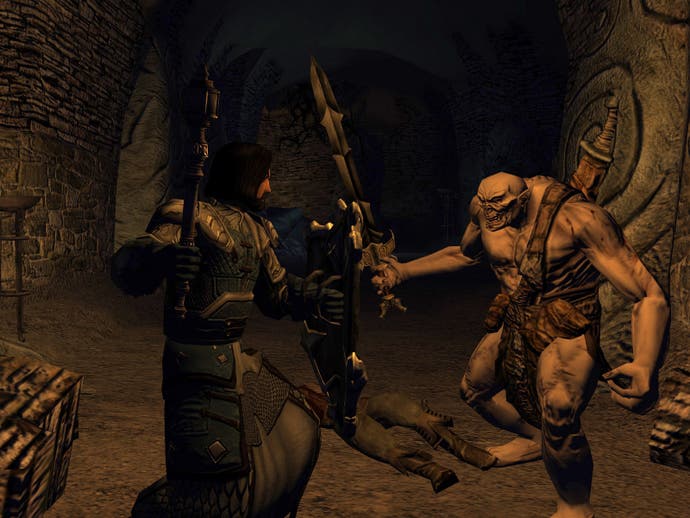
The final element of Lord of the Rings Online which is worthy of some in-depth discussion is the PvP - or rather, the lack of it. The game doesn't allow players to fight each other (except in friendly duels), and it doesn't allow you to play as an Orc, or an Uruk-Hai, or any of the other nasties from the LOTR universe. At least, not directly.
What you can do, however, is participate in the Monster Game - essentially a side game to the main MMORPG, where you roll a monster character and take part in a capture and hold style PvP game. You can play as a variety of Tolkien bad-guy archetypes - for some reason, the arachnophobe in me makes me want to play a giant spider - and like your main character in the game, this monster character is persistent and continues to evolve as you play, collecting "Destiny Points" with each player you kill or objective you secure.
Initially, this all seems a little bit tacked on, like a lame excuse for proper PvP - but after taking part for a few hours, we're not so sure. The Monster Game is damned good fun, and it's been implemented extremely well. It takes place over a vast swathe of the game world, full of towers, keeps and rally points to control, and allows up to five monsters to group together and play as a team.
What's more, the rewards you earn as a monster can either be spent on upgrading your monster character - or can be brought back into the "main" game with you, where you can spend them on buffs for your regular, good-guy characters. Turbine assures us that as the game progresses, more and more new areas of the world will be opened up to Monster play, and it certainly makes sense as part of the lore. As the game reaches east towards Mordor, more and more of the ground it covers will be the site of famous battles - Helm's Deep, Osgiliath, Pelennor Fields, and so on - and each of those areas is likely to be a permanent PvP battleground where players in heroic and monster guises will clash.
Return of the King?
After playing in the beta for a few weeks, then, our hopes for Lord of the Rings Online are surprisingly high. It would be an easy game to dislike just on principle; a game which runs riot with some elements of Tolkien's much-loved creation, an MMORPG which seems set on challenging WoW purely on the basis of a popular license. However, the simple fact is that Turbine, so far, seem to be doing a damned good job of pulling it all together.
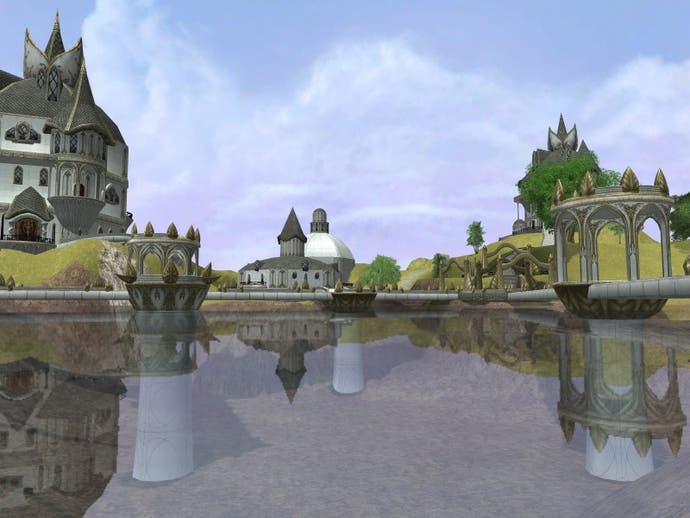
LOTRO won't make everyone happy, but when Jeff Steefel tells us that "if there's any game that can take on WOW, this is it", we're inclined to believe him. LOTRO will be enormous at launch, with over 100 unique areas, 2000 NPCs, 1500 quests and 3000 different creatures to battle - and this is only the beginning. If the game can capture the interest of LOTR fans, there will be astonishing anticipation for the obvious expansions, which will bring the game east of the Misty Mountains and south into Rohan, Gondor and eventually Mordor.
Of course, one does not simply walk into Mordor. If LOTRO is ever to make it to the Dark Lord's lands, the game will have to convince legions of people to part with a monthly subscription fee. It will have to be more than just graphically beautiful, somewhat clever, and evocative of LOTR fantasies of our teenaged years - it will have to be slick, compelling and utterly, utterly addictive. Our hugely positive first impressions of the game don't mean that Turbine doesn't have its work cut out for it... But it does mean that it might just get it right.
The Lord of the Rings launches on April 24th, with pre-ordering players getting a 10 day head-start on April 14th. The game's subscription is priced at at 8.99 Euro (GBP 5.99) a month, with a 149.99 Euro (GBP 99.99) lifetime subscription also being offered.


